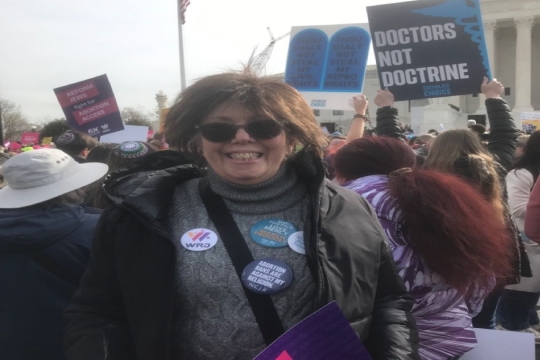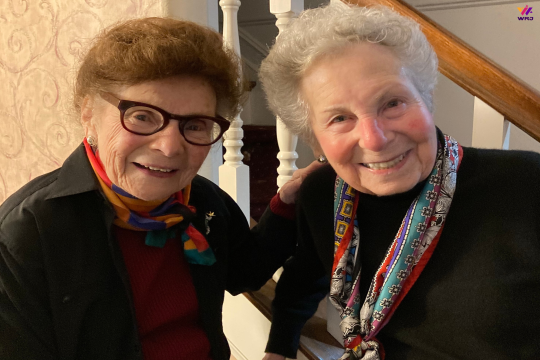
For six years, I’ve been lucky to be one of the representatives from WRJ to the United Nations (UN). Along with Leslie Brier, our chief rep, and Vivian Blumstein, I’ve been attending sessions of the UN, first in person, and then on Zoom. One could attend a UN session two or three times a day if one had the time and inclination! There are so many meetings and much to learn. Our practice has been to choose the sessions most relevant to WRJ and divide them among us.
WRJ has been involved with the UN as a Non-Governmental Organization (NGO) since it was created. My involvement with the UN followed years in WRJ, first as a sisterhood president and WRJ Board member, as Recording Secretary of WRJ's Board, and later as Trustee of my synagogue, Congregation Rodeph Sholom in New York City, where I am still a member of the sisterhood. All along, sisterhood has sustained me. After all those years, I was honored to be asked to become a WRJ Representative to the UN, continuing my proud WRJ connection. This meant attending sessions at the UN on a variety of subjects germane to the goals of WRJ and informing our membership on the goings-on at the UN.
It's a huge thrill to be a member of an organization whose main goal is to promote peace in the world and ensure human rights for all! Every time I step into the UN, I am awed by the enormity of its goals and the expansiveness of its presence. Even on Zoom calls, I can see the impact of a global body, as there can be hundreds of participants.
In January of 2023, I attended a virtual monthly meeting of the National Council on the Status of Women (CSW), an American group, which invites all member states of the UN to listen in on their programs. This program is a prime example of what the UN stands for and why WRJ sends representatives. The program was called, “Exploring Innovation in Technologies: Fostering Digital Education Towards Achieving Gender Equality.” There were six speakers and 300 participants from all over the globe.
The issue at hand was gender equality. Despite many improvements in gender parity, the divide between the rights of women and men is increasing. COVID-19 made an already dire situation worse, especially in certain developing countries where girls and women cannot go to school or get jobs. Equality in education is one of the UN’s many ‘Sustainable Development Goals.” To this end, this program focused on the use of advanced technology to address this ‘learning crisis.’ Digital access to the internet is limited and unaffordable. In South Africa, only 13% of the population has access to connectivity. Regulatory powers are still being controlled by a male majority. Technology and policies are not neutral and need to commit resources without gender bias. Institutional and structural discrimination continues without change. One speaker said we must apply a gendered perspective and analysis of the data and make systemic changes. We must elect more women to policy-making positions in government and make our local officials work for us. Another promoted more women-led research, women-led invention, women-led marketing, and the use of established best practices. Organizations were encouraged to work together in common cause, pooling their resources and ideas.
Another speaker, who runs an organization called Global Digital Inclusion Partnerships in South America, said the goal was to bring ‘meaningful connectivity to the global majority.’ There needs to be a foundation for affordable access to digital data, something that seemed to them very far off in the future. She felt that funding for such data should be transparent and equally distributed, but also, that women had to be their own advocates. “React! If you’re not reacting, you are part of the problem!”
One example of a successful educational program working in the global community is ‘The Learning Passport,’ an arm of UNICEF. The head of the program, a gentleman living in Valencia, Spain, was one of our speakers. The program applies advanced technology to the most threatened students, largely girls. The goal is to reach 200 million children who cannot access digital space by supplying them with servers that can connect them online. This ‘blended learning program,’ teacher, student, and classroom, is already serving three million learners in 28 countries. Fifty-seven percent of the enrolled learners are female. First and foremost, it teaches skills. It also provides early childhood programs, mental health and psychosocial support, sex ed, violence against women, support emergency response access, a global library in many languages, and other educational materials. The Learning Passport works with education ministries, private-public organizations, and has many, many partnerships. For more information on the Learning Passport, go to LearningPassport.org, or UNICEF.
This Zoom meeting of the CSW was most compelling and impressive. By looking at educational crises from a technological standpoint, the UN is identifying the many factors that are interfering with learning and linking them with defined goals and solutions. As WRJ is concerned with equality for women in education, in the workplace, and in finances, to name only a few, access to digital data becomes another important goal in our global world.
Related Posts

Andrea Stillman: A WRJ Leadership Spotlight


